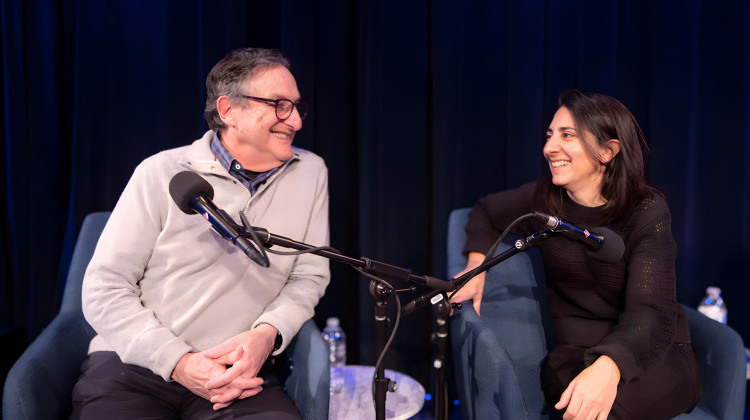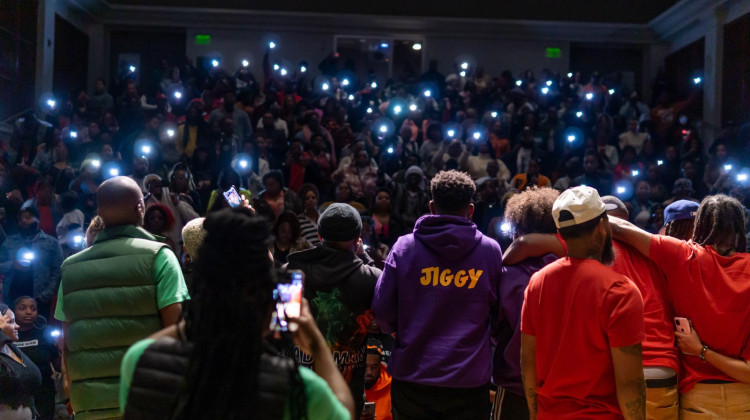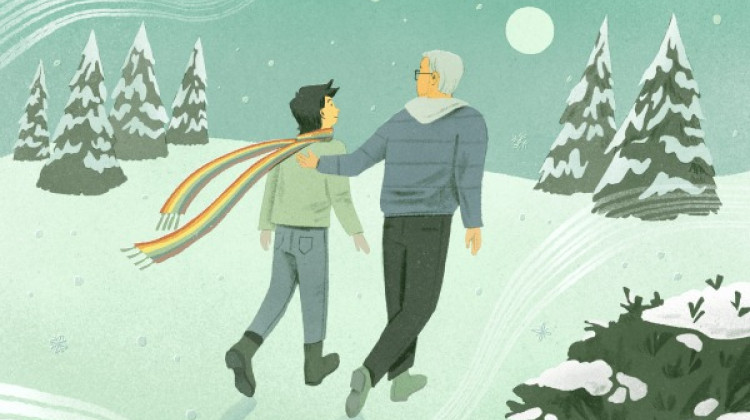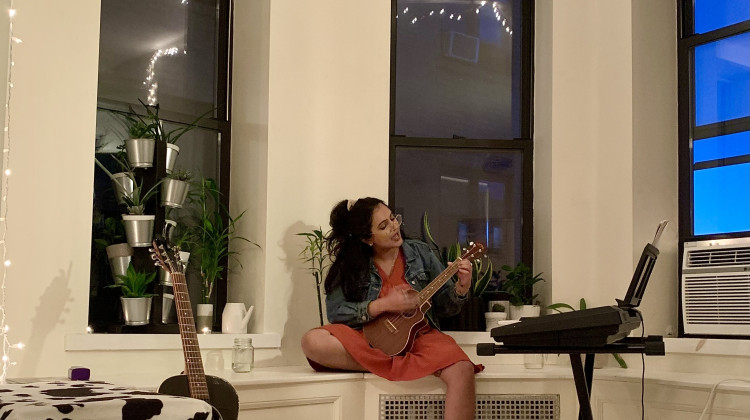
Science Friday will now have two hosts: Ira Flatow, the program’s founder, and veteran science journalist Flora Lichtman.
Photo Courtesy of Science Friday"Science Friday" has returned to WFYI. You can listen every Friday from 2 – 4 p.m.
WFYI’s Kyle Long recently spoke with the show’s host, Ira Flatow. They discussed the show's past, present and future.
This interview has been edited for length and clarity.
Kyle Long: Ira, thank you for taking a few minutes to speak with me today.
Ira Flatow: Nice to be here. Thank you for asking.
Long: You've had a passion for science from an early age. When I was preparing to speak with you today, I stumbled on a 1963 newspaper article that featured a computer punch card reader you created for a school science fair.
Flatow: You did? You really found that?
Long: Yes, “Ira Flatow of Franklin Square shows Rabbi Meyer Fendel how his computer punch card reader works.”
Flatow: You really did dig deep on that one.
Long: When did your love of science begin and what sparked that interest?
Flatow: I was always one of these geeky kids in the basement who took things apart, blew stuff up, and my passion was for electronic devices. That's why you have that 63 article there where I made a punch card reader, which I'll bet you a lot of your listeners have never heard of or seen so and I've always had that since I was a kid, and I I did it through high school. I studied engineering in college. I was always interested in this, and so that's how it began.
Long: Ira, one of my first encounters with public media was watching you on Newton's Apple. You hosted Newton's Apple from 1983 to 1988 and before that, you were a science correspondent for NPR. How did your interest in science and broadcasting intersect in such a perfect way? It
Flatow: There was a lot of luck involved. I was in college in Buffalo, and I was studying engineering, and I was not a really very good engineering student. I noticed that there was a radio station WBFO in Buffalo on the campus of the university. I said, “What the heck? Maybe I'll find something there that I like doing.” They had a staff meeting. I went into the staff meeting thinking I would be a techie guy. But just at that time in Buffalo, we're talking the late ‘60s, the Vietnam War anti-war movement was moving very heavily across the country, and had arrived at Buffalo.
They were wanting to recruit new reporters, training new reporters how to cover the demonstrations and speeches and riots and things like that. They had a meeting, and said, “Anybody want to learn how to do that?” And I said, “What the heck?” I raised my hand, and sure enough, they basically threw a tape recorder at me and said, and said, “You'll learn on the job.”
When the first Earth Day came up in 1970 I said, “Well, here's here's an opportunity maybe, to branch out into something I really like, which is science reporting. Let me try science reporting.” So basically, I started my science reporting career in 1970 at the first Earth Day on campus there.
From there, I was lucky. I say I was lucky because at the campus radio station, the general manager, Bill Siemering was tapped to go to Washington to help start NPR in 1970. So in 1971 when I was graduating, I had moved up to become the news director at the campus radio station. I asked Bill if he would hire me. He said, “No, you're over qualified.” But my mentor, Mike Waters, who went down from Buffalo with him, he talked Bill searing into hiring me. So I got to NPR in the first year it was on, and I was able to really get my science reporting career going there.
Long: Ira, "Science Friday" was created in 1991 the show is entering its 34th year on the air. For our listeners who haven't heard "Science Friday," can you give us sort of a thumbnail sketch of what they'll hear each week?
Flatow: We like to cover the news you will hear other places and the news you won't. So we go through all the journals. There are hundreds of hundreds of news stories, scientific research papers that come out every week.
So we try to find ones that you don't hear much about, we're looking at one this week for a possible show coming up about why some people can do hula hoops very well and why some people can't. There was a research paper published on that. Or we'll get into some very meaty things, like what's happening with this new Bird Flu virus. If you're curious about the world and you want to have a little fun, we do that. If you want to know about serious topics, we do that also.
So each week, we'll have a mix of anywhere from 7, 8, 9, 10, 11, or 12 stories that will cover the waterfront of everything that's going on that we find interesting. We also want to hear from our listeners about what they want us to cover. So there's something for everybody on our show.
Long: I mentioned the show has been on the air for 34 years. You've been hosting the show for that run. You have some exciting news about the future of the show, right?
Flatow: Yeah, this week, we're welcoming a new host, Flora Lichtman, who was with us many years ago as a producer. She went on out on her own, made her way as a very good podcaster and doing videos. She's going to be joining me now as a host, so we have two hosts, me and Flora. We’ll be be hosting together, and we'll be hosting separately.
So people will be able to hear the wonderful stuff that hope that Flora Lichtman brings to the show, and anybody who's been a long term listener to "Science Friday" certainly recognizes her name and her presence on the air. We’re very excited about that.
Long: Ira, can you talk a bit about the importance of making scientific information accessible to a mass audience? That seems particularly important right now. In recent years, we've seen a lot of bad information spread, misinformation about vaccines and climate change. There's even a small community of folks who believe the Earth is flat. Any thoughts you'd like to share on the importance of platforms like "Science Friday" in combating misinformation and creating a better informed community?
Flatow: Yes, what we do now, I think, is more important, or as important as anything we've done in our past 34 years. Just your flat Earth little anecdote, one of the major flat-earthers was taken to Antarctica, and finally had to admit that Earth was not flat since he made it to the South Pole or Antarctica.
But yeah, with all the misinformation about health, with the appointment of new administration, people coming in who are not great believers in vaccination or the importance of science, and how we all depend on data and research, and how every everything in our community, everything in our lives, basically depends on science, whether it's technology that comes out from science, or medicine that comes out from science, it is important for us now to provide a platform for people where they can tune in, or they can podcast us and hear trusted, really good, trusted information about science.
Because we've been doing this, as you say, we're in our 34th year now, and we bring on people who and scientists who would not go on other programs, because they're not going to be given much time to talk about what they believe in, or what they know to be true, or what the research data tells them. We bring them on, and they talk to us as long as we want.
That's why I'm glad, even though we've been on air for so many decades, I'm glad we're still on now, because we we can be, modestly, a beacon of real facts and data for the public. We hope people will appreciate it, and they do. We can tell from the reactions we get from emails and letters that come in.
Long: "Science Friday" returns to WFYI on January 10th. You can listen every Fiday from 2 to 4 p.m. Any final thoughts you want to share with our listeners here in Indiana?
Flatow: Besides basketball, I think science is really important for folks in Indiana and everywhere else, and I welcome your input. That's one thing we want our listeners to do. We’re not just a radio show, we have a web page with educational material for teachers. We’ll help you teach science. We have outreach programs. We have book clubs. We have newsletters.
We're not just a radio program. Even though you'll hear us on the radio, we'll give you resources to listen and learn all kinds of different ways using "Science Friday" as a resource. I’m very happy to be with you folks, and I'm hoping that this is the start of a long friendship between us and you folks out there.
Long: Ira, thank you so much for taking time to join us today.
Flatow: You're welcome. Thank you.
This interview originally aired on WFYI's Cultural Manifesto.
 DONATE
DONATE







 Support WFYI. We can't do it without you.
Support WFYI. We can't do it without you.